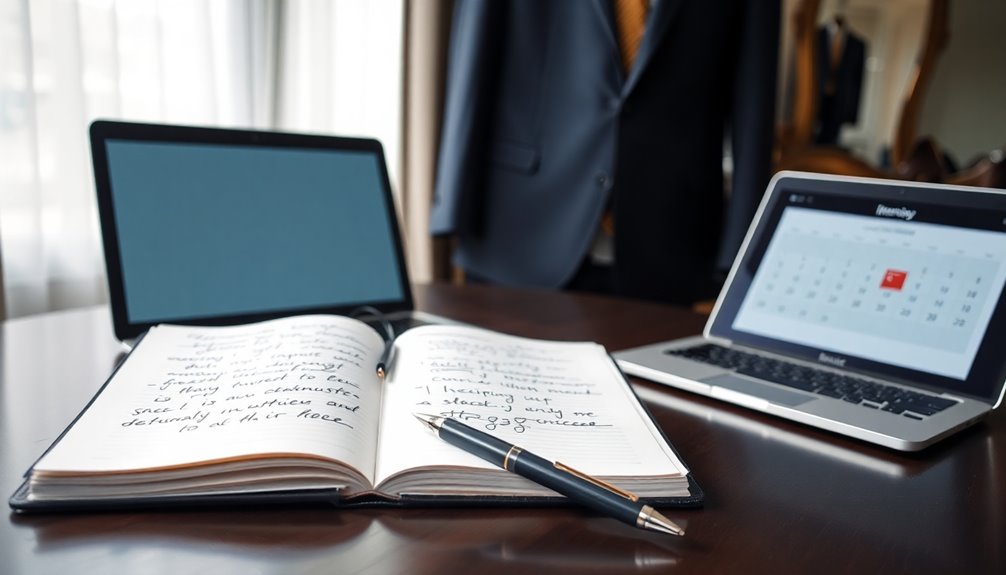To become an unstoppable interview force, practice these five essential moves. First, master storytelling using the STAR method to convey your key career moments clearly. Next, refine your body language—maintain eye contact and a strong posture to project confidence. Don't forget to develop active listening skills; use reflective listening to engage with your interviewer. Prepare insightful questions to show your interest and understanding of the role. Finally, cultivate a growth mindset by viewing challenges as opportunities to grow. By focusing on these areas, you'll boost your interview success, and there's even more to explore about each step!
Key Takeaways
- Utilize the STAR method to clearly articulate your key career moments and align them with the company's values.
- Practice controlled breathing and maintain upright posture to project confidence and manage anxiety during the interview.
- Engage in active listening by using reflective techniques and responding to non-verbal cues to enhance connection with the interviewer.
- Prepare insightful, open-ended questions that showcase your interest in the role and demonstrate your understanding of the company's challenges.
- Cultivate a growth mindset by viewing challenges as opportunities for development and actively seeking feedback for continuous improvement.
Master Your Storytelling Skills

Mastering your storytelling skills is essential for making a memorable impression during interviews. One effective way to craft a compelling narrative is by using the STAR method—Situation, Task, Action, Result. This method helps you clearly convey your experiences and achievements, making your responses impactful.
During your interview preparation, identify key moments in your career that showcase your strengths. Align these stories with the company's values and mission to demonstrate that you're not just a fit for the role, but also for the organization's culture. Conciseness is key; keep your stories engaging to maintain the interviewer's interest.
To refine your delivery, record and review your practice sessions. Pay attention to clarity, pacing, and emotional engagement, identifying areas where you can improve. Tailor your stories to highlight skills and experiences that directly relate to the job description. This customization shows that you understand the role and are prepared to contribute meaningfully. Additionally, consider using market research to better understand the company and industry, which can enhance your storytelling and make your examples even more relevant.
Refine Your Body Language

Crafting a compelling narrative is just one part of making a strong impression during interviews; refining your body language is equally important. Non-verbal communication accounts for over 70% of the impressions you make, so your body language can greatly impact how interviewers perceive you.
Start with a firm handshake and maintain an upright posture; these small actions signal professionalism and approachability. Eye contact is another key element; studies show that candidates who engage in appropriate eye contact come across as more trustworthy and confident.
To manage any anxiety, practice controlled breathing and avoid filler words, which enhances the clarity of your verbal communication. Remember, your body language should complement your spoken words; erratic movements or closed postures can undermine your presence.
Consider recording your practice sessions. This allows you to identify habits like excessive fidgeting, helping you make necessary adjustments. By refining your body language, you'll project confidence and engagement, making a lasting impression that can set you apart from other candidates. Embrace these techniques, and you'll become an unstoppable interview force! Additionally, maintaining a positive mindset can significantly enhance your overall performance during interviews.
Develop Active Listening Techniques

Engage fully in conversations during your interviews by honing your active listening skills. Active listening means concentrating on, understanding, and responding to what the interviewer says. It's essential for effective communication and can set you apart from other candidates. Remember, over 70% of communication is non-verbal, so pay attention to body language and tone in addition to the words spoken.
One effective technique is reflective listening. By paraphrasing what the interviewer says, you not only clarify your understanding but also demonstrate that you're engaged in the conversation. This approach shows you value their input and helps build rapport.
Additionally, consider incorporating open-ended questions into your dialogue. These questions invite deeper discussion and reveal your genuine interest in the role and the organization.
Studies indicate that candidates who actively listen and respond thoughtfully are seen as more competent and likable. By practicing these active listening techniques, you'll enhance your ability to connect with interviewers, making you a more compelling candidate. Remember, every detail matters, so tune in, reflect, and engage to become an unstoppable interview force! Furthermore, strong communication skills are vital in building rapport and demonstrating your value as a candidate.
Prepare Insightful Questions

As you enhance your active listening skills, preparing insightful questions can further elevate your interview performance. Thoughtful questions not only demonstrate your knowledge of the company's culture, values, and recent developments but also show your genuine interest. Start by inquiring about the role's impact and team priorities; this highlights your strategic thinking and alignment with organizational goals.
Focus on using open-ended questions that encourage a two-way conversation. This approach fosters deeper engagement with the interviewer, making the discussion more dynamic. For instance, ask about the challenges the team is currently facing or the skills they value most in a candidate.
Additionally, questions about growth opportunities and the company's direction can reinforce your commitment to long-term success within the organization. Tailor your questions based on your research about the company, ensuring they're relevant and insightful. This preparation not only leaves a positive impression but also positions you as a candidate who's invested in understanding and contributing to the company's mission. Remember, the goal is to prepare insightful questions that reflect both your interest and your strategic mindset.
Moreover, demonstrating an understanding of financial metrics can further illustrate your preparedness and relevance to the role, as it indicates your capability for informed decision-making within the company's operational framework.
Cultivate a Growth Mindset

Cultivating a growth mindset is essential for maneuvering the interview process with confidence and resilience. When you embrace this mindset, you start viewing challenges as opportunities for development. This shift helps improve your problem-solving skills and boosts your resilience during interviews. Research shows that those with a growth mindset are more likely to persist in the face of setbacks, which is critical for overcoming interview anxiety. By refining your performance through feedback, you can elevate your chances of success.
To cultivate a growth mindset, recognize that your abilities can be developed through dedication and effort. This realization fosters a proactive approach to interview preparation and skill enhancement. Engage in continuous learning, which enhances your ability to adapt to unexpected questions or scenarios during interviews. Additionally, practicing self-reflection techniques can help you identify areas for improvement and further enhance your performance.
Studies indicate that a growth mindset positively influences overall performance. Candidates who adopt this mindset often display greater confidence and improved communication skills, both essential for successful interviews. So, embrace challenges, seek feedback, and stay committed to your growth. By cultivating a growth mindset, you'll not only boost your interview skills, but also position yourself as an unstoppable interview force.
Frequently Asked Questions
What Are the 5 Steps Involved in Interviewing?
When interviewing, you should focus on five key steps. First, prepare by researching the company and role. Next, perform a self-assessment to identify your strengths and weaknesses. Then, engage in mock interviews to build confidence. After that, hone your communication skills, mastering both verbal and non-verbal cues. Finally, reflect on your performance post-interview, sending follow-up messages and maintaining a growth mindset to improve for future opportunities.
What Are the 4 Best Interview Practices?
Preparing for an interview is like sharpening a knife before cooking; it makes all the difference. First, research the company thoroughly to tailor your responses. Next, practice common questions and use the STAR method to structure your answers. Engage the interviewer with thoughtful questions that show your interest. Finally, conduct mock interviews to build confidence and reflect on your performance afterward, maintaining a positive mindset throughout the process.
How Do You Ace an Interview 5 Tips?
To ace an interview, start by mastering common questions like "Tell me about yourself." Next, research the company's culture and values to tailor your responses. Use the STAR method for behavioral questions, providing clear examples of your experiences. Prepare insightful questions to engage the interviewer and show your strategic thinking. Finally, practice mock interviews multiple times to refine your delivery and manage nerves, using feedback to enhance your performance.
What Is the Rule of 3 in Interviewing?
Think of your interview as a stage, and you're the star performer. The Rule of 3 in interviewing means you should present your answers in threes—three key points or examples. This technique not only makes your responses clearer but also helps the interviewer remember your message. By structuring your thoughts this way, you can effectively showcase your strengths and experiences, leaving a lasting impression that resonates long after the curtain falls.
Conclusion
In the grand theater of interviews, each move you practice becomes a spotlight illuminating your unique story. As you refine your body language and sharpen your listening skills, you're like a skilled musician tuning their instrument, ready to play a symphony of confidence. By preparing insightful questions and nurturing a growth mindset, you transform into an unstoppable force, much like a river carving its path through stone. Embrace these techniques, and watch your career journey flourish!









